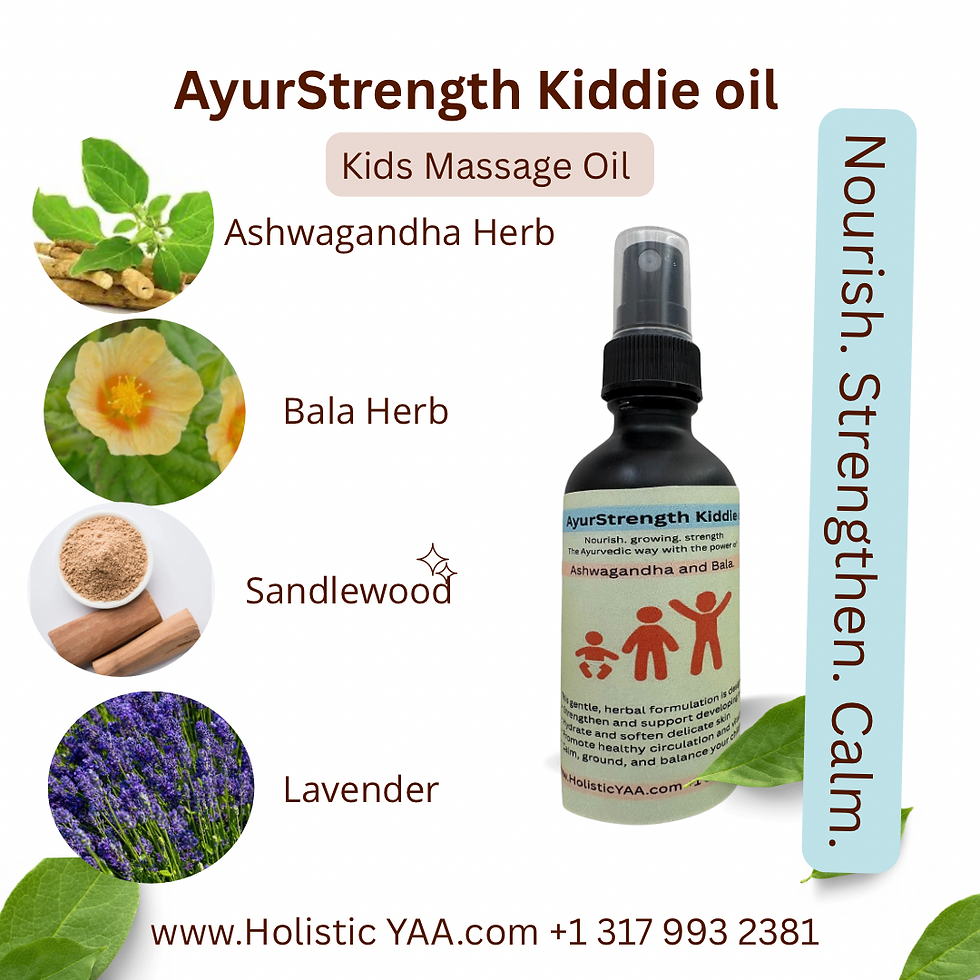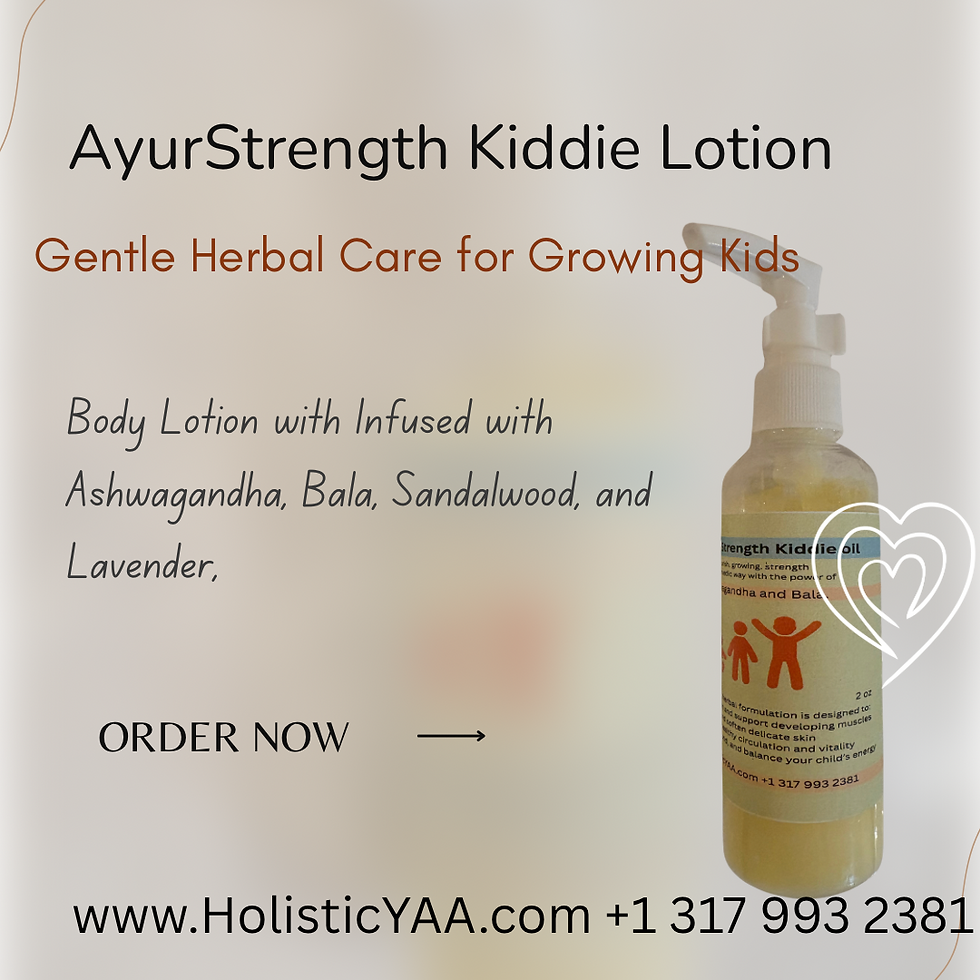ADHD: Ayurvedic Understanding and Holistic Management
- Bhawna Mittal
- Aug 16, 2025
- 4 min read
1. What is ADHD? (Attention-Deficit/Hyperactivity Disorder)
ADHD is a neurodevelopmental condition that typically emerges in early childhood and may persist into adolescence and adulthood. It is marked by three core behavioral patterns:
Inattention: Difficulty concentrating, forgetfulness, disorganization, and easily getting distracted.
Hyperactivity: Constant movement, fidgeting, excessive talking, and difficulty staying seated.
Impulsivity: Acting without thinking, interrupting others, and struggling with delayed gratification.
These behaviors can significantly affect a child’s academic performance, social relationships, and emotional regulation.
2. Causes and Contributing Factors of ADHD (Modern Viewpoint)
Though the exact cause of ADHD remains unclear, several biological and environmental factors may contribute:
Genetics: ADHD frequently runs in families and may involve genetic mutations affecting brain development.
Brain Structure & Chemistry: Imbalances in neurotransmitters (especially dopamine) and delayed brain maturation may be involved.
Prenatal Influences: Maternal stress, tobacco, alcohol, or drug use during pregnancy increase risk.
Environmental Toxins: Lead exposure, synthetic food additives, and environmental chemicals can affect brain function.
Poor Prenatal Nutrition: A mother’s diet lacking essential fatty acids, iron, magnesium, or Ayurvedic nourishment may lead to compromised fetal brain development.
Early Childhood Stress or Trauma: Neglect, emotional trauma, or poor attachment can disrupt neurological and emotional development.
3. ADHD in Ayurveda: A Functional and Energetic View
Ayurveda views ADHD not as a fixed diagnosis but as a disturbance in doshic balance, primarily:
Vata Dosha (Air + Ether): Governs nervous system functions and movement. When aggravated, it results in restlessness, erratic thoughts, impulsivity, and poor focus.
Pitta Dosha (Fire + Water): Governs intellect, digestion, and emotional regulation. Its imbalance leads to irritability, frustration, and emotional intensity.
Majja Dhatu (Nerve Tissue): Represents the nervous system. Weak or imbalanced Majja affects memory, coordination, and mental clarity.
Manovaha Srotas (Mind Channels): Blockages here disturb emotional processing, attention, and comprehension.
Agni (digestive fire) becomes irregular in ADHD, impairing nutrient absorption and mental assimilation. Over time, this weakens Ojas (vital energy), leading to hypersensitivity, fatigue, and emotional instability.
4. Ayurvedic Prenatal Care: Building the Foundation for a Balanced Mind
Ayurveda offers detailed guidelines for Garbhini Paricharya (prenatal regimen) to nourish the fetus’s body and mind right from conception.
A. Prakriti-Based Care for Pregnant Mothers
An Ayurvedic practitioner tailors recommendations based on the mother’s Prakriti (body-mind constitution).
Vata and Pitta should be carefully managed through calming lifestyle, reduced stimulation, and emotional support.
A sattvic environment, uplifting thoughts, nurturing relationships, and routine spiritual practices are encouraged for emotional imprinting of the fetus.
B. Prenatal Yoga for Mental Grounding
Gentle yoga postures such as Cat-Cow, Supported Bound Angle, Child’s Pose, and Deep Breathing promote relaxation and optimal circulation.
Breath awareness enhances connection between the mother and fetus, regulating the maternal nervous system and contributing to fetal neurological growth.
C. Prenatal Diet and Herbal Support
Emphasis is on warm, nourishing, and unprocessed sattvic food to support healthy brain tissue (Majja Dhatu) and mental clarity.
Incorporating ghee, milk, soaked almonds, walnuts, dates, saffron, and seasonal fruits.
Herbs like Brahmi, Shankhpushpi, and Ashwagandha may be used (under professional supervision) to support cognition, emotional stability, and immune strength.
5. Pediatric Ayurvedic Management of ADHD
A. Ayurvedic Herbal Formulas (e.g., AyurKids)
Herbs should only be used under professional Ayurvedic supervision, especially for children.
Brahmi (Bacopa monnieri): Improves memory, learning ability, and induces calm.
Mandukaparni (Gotu Kola): Strengthens nervous tissue, enhances blood circulation to the brain.
Shankhpushpi: Reduces hyperactivity, sharpens intellect, supports peaceful sleep.
Ashwagandha: Calms the overactive mind, strengthens coordination, and reduces anxiety.
Holistic YAA’s AyurKids formula may include these herbs in gentle, child-safe forms such as ghee, syrups, or medicated milk.
B. Pediatric Massage (Abhyanga) with AyurStrength Kiddie Lotion or Oil
Massage helps regulate Vata dosha and improves neuro-muscular function in children with ADHD.
Kids Massage oil : https://www.holisticyaa.com/product-page/ayurstrength-kiddie-oil-kids-massage-oil

Kids Massage Lotion: https://www.holisticyaa.com/product-page/ayurstrength-kiddie-lotion

Benefits of Pediatric Massage:
Calms the mind and enhances sleep.
Improves sensory-motor integration and body awareness.
Supports digestion and emotional stability.
Promotes bonding between caregiver and child.
Recommended Oils:
AyurStrength Kiddie Oil or Lotion is infused with:
Ashwagandha & Brahmi: For calming nervous activity.
Bala: Strengthens muscles and coordination.
Shatavari: Nourishes developing tissues.
Scalp massage with a blend of Brahmi, Amla, Bhringraj, Castor, and Rosemary oils enhances mental clarity, hair health, and grounding through the crown chakra (Sahasrara).
Daily or alternate-day massage followed by a warm bath supports long-term regulation of Vata dosha.
C. Diet Guidelines for Children with ADHD
Encouraged:
Warm, freshly cooked meals with ghee, rice, lentils, soft vegetables, and seasonal fruits.
Nut and seed butters, whole grains, herbal teas (Tulsi, Brahmi, Chamomile in small doses).
Avoid:
Cold, dry, or processed foods.
Artificial additives, refined sugar, carbonated beverages.
Disruptive mealtime environments or irregular eating schedules.
Routines:
Fixed mealtimes, distraction-free eating, mindful chewing—all help strengthen Agni and mental assimilation.
6. Yoga Therapy for Children with ADHD
Yoga offers a safe and playful environment to balance movement with stillness, helping ADHD children develop mental clarity, emotional control, and physical awareness.
A. Benefits of Kids Yoga:
Enhances focus, self-discipline, and stillness.
Promotes body awareness, posture correction, and balance.
Increases emotional resilience and social confidence.
B. Focus and Balance Poses:
Tree Pose (Vrikshasana): Enhances one-pointed focus and body stability.
Warrior Poses: Promote strength, direction, and perseverance.
Cat-Cow, Cobra, and Bridge Pose: Regulate the nervous system and support spinal health.
C. Flow and Transformation:
Transitioning from one pose to another with awareness teaches mind-body coordination, sequencing, and attentiveness.
Children practice maintaining focus in one position and learning to shift smoothly to the next, engaging both hemispheres of the brain.
D. Inversion Poses (gentle):
Poses like Legs-Up-the-Wall (Viparita Karani) or supported shoulder stand (under supervision) calm the nervous system, increase blood flow to the brain, and enhance clarity.
Inversions promote regulation of energy and improve sleep.
7. The Role of Ayurveda in Long-Term ADHD Management
Ayurveda supports children with ADHD by addressing their individuality and working through mind-body harmony. It provides:
Root Cause Resolution: Balancing Vata-Pitta and rebuilding Majja Dhatu.
Lifestyle Anchoring: With Dinacharya (daily rhythm), mindful eating, massage, and play-based yoga.
Herbal and Nutritional Support: Customized to age, digestion, and constitution.
Empowered Parenting: Educating caregivers to nurture emotional safety and consistent structure.
Conclusion
ADHD is not simply a behavioral issue—it is a sign of internal imbalance that can be addressed holistically. Through prenatal awareness, individualized pediatric care, and therapeutic lifestyle practices, Ayurveda empowers children to reach their full potential.
Rather than suppressing symptoms, Ayurveda helps strengthen the nervous system, improve digestion, restore clarity, and guide children toward balanced, joyful living.
Healing begins with understanding, and growth begins with nurturing—Ayurveda offers both.







